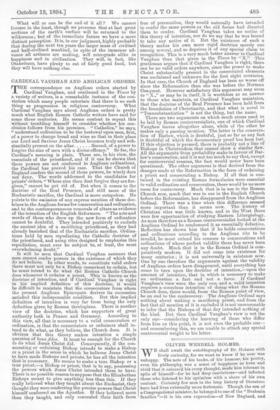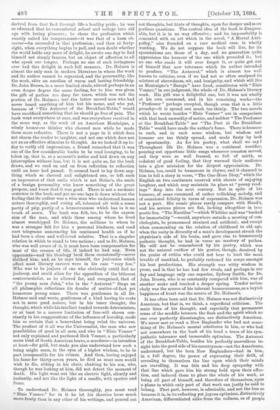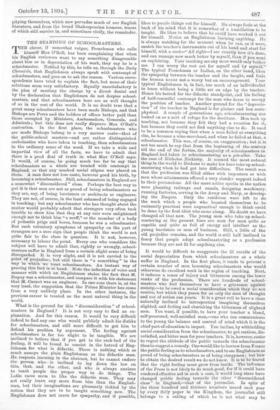OLIVER WENDELL HOLMES.
WE shall await the autobiography of Dr. Holmes with lively curiosity, for we want to know if he ever was unhappy. The note of his books, of his humour, his poetry, even his philosophy, was a sense of happiness so keen and vivid that it coloured his every thought, made him tolerant in spite of himself—for he had deep convictions—and infected those who listened to his optimism with a share of his own content. Certainly few men in the long history of literature have had lives externally more fortunate. Though the son of a Congregational minister, he belonged to one of the "Brahmin families "—it is his own expression—of New England, and derived from that fact through life a healthy pride ; he was so educated that he remembered school and college into old age with loving pleasure ; he chose the profession which exactly suited his temperament—it was that of a keen ob- server—be succeeded in that profession; and then at forty- eight, when everything begins to pall, and men doubt whether the world holds any more of delight, he awoke one day to find himself not simply famous, but an object of affection to all who speak our tongue. Perhaps no one of such lovingness ever had this delight in such full measure. Dr. Holmes is almost the only man in modern literature in whom the work and its author cannot be separated, and the personality, like the work, stirs an emotion of warm and lasting friendship. Dr. John Brown, in a more limited circle, stirred perhaps in an even deeper degree the same feeling, for to him was given the gift of pathos too deep for tears, which was not the portion of Dr. Holmes ; but the latter moved men who had never heard anything of him but his name, and who yet, because of " The Autocrat of the Breakfast-Table," would have sacrificed something that he should go free of pain. The book went everywhere at once, and was everywhere received in the same way, as the work of an American Montaigne, a wisely humorous thinker who cheered men while he made them more reflective. There is not a page in it which does not charm the reader to laughter, and not one which does not act as an effective stimulus to thought. As we looked it up to- day to verify old impressions, a friend remarked that it was one of the few considerable books to be read lounging, to be taken up, that is, at a moment's notice and laid down on any interruption without loss, bat it is not quite so, for the book draws, and we read on and on from reflection to reflection until an hour had passed. It seemed hard to lay down any- thing winch so cheered and enlightened one, or left such an impression of that smile which is not Heine's, the smile of a benign personality who knew something of the great purpose, and knew that it was good. There is not a sardonic sentence in the book, and yet no one lays it down without the feeling that its author was a wise man who understood human nature thoroughly, and seeing all, tolerated all with a sense partly of pity, partly of a humorousness which has in it no touch of scorn. The book was felt, too, to be the expres- sion of the man, and while those among whom he lived almost worshipped Dr. Holmes, the millions to whom he was a stranger felt for him a personal kindness, and read cart telegrams announcing his continued health as if he had been a close and well-loved relative. That is a singular relation in which to stand to two nations ; and to Dr. Holmes, who was well aware of it, it must have been compensation for most of the crosses of life, if indeed he had any. Even opponents—and his theology bred them occasionally—never disliked him, and, as he says himself, the jealousies which affect most literary careers were in his case " very few." Who was to be jealous of one who obviously could feel no jealousy, and could allow for the opposition of the bitterest controversialist, as he allowed for, and recognised, that of "the young man John," who in the " Autocrat " flings on all philosophic reflections his douche of matter-of-fact yet humorous young sense. There was gentleness in all Dr.
Holmes said and wrote, gentleness of a kind having its roots not in mere good nature, but in his inner thought, the thought, which while his intellect tended towards determinism, or at least to a narrow limitation of free-will shown con- stantly in his exaggerations of the influence of heredity, made him so certain that a benevolent being ruled the universe.
The product of it all was the Universalist, the man who saw possibilities of good in all men, and who in "Elsie Venner" not only explained and pardoned Dick Venner, a particularly mean kind of South American bravo, a murderer—in intention at least—for gold, but made you also understand how such a being might seem, in the eyes of a higher wisdom, to be in part irresponsible for his crimes. And then, having enjoyed his fame for thirty-seven years, he died as most men would wish to die, sitting in his chair, chatting to his son, who, though he was looking at him, did not detect the moment of death. His light went out like an electric light, silently and instantly, and not like the light of a candle, with sputter and fume.
To understand Dr. Holmes thoroughly, you must read " Elsie Venner," for in it he let his theories loose much more freely than in any other of his writings, and poured out not thoughts, but hints of thoughts, upon far deeper and more perilous questions. The central idea of the book is disagree- able, but it is in no way offensive ; and its impossibility is concealed with an art which in. the novel, " A Mortal Anti- pathy," also founded on a rare medical case, is wholly wanting. We do not suppose the book will live, for its speculations are those of a day, and no generation quite appreciates the humour of the one which preceded it ; but no one who reads it will ever forget it, or quite get out of himself that new tolerance which its author intended to produce. " The Autocrat," which is almost too well known to criticise, even if we had not so often analysed its mixture of shrewdness, wit, and benignity, and which will live as Montaigne's " Essays " have lived, constitutes with " Elsie Venner," in oar judgment, the whole of Dr. Holmes's literary work. His gift was a delightful one, but it was not wholly at his own command, and in his remaining works—the " Professor " perhaps excepted, though even. that is a little preachy—it is spread out much too thinly. The two novels which he wrote besides "Elsie Venner" are in comparison with that book unworthy of notice, and neither " The Professor at the Breakfast-Table" nor "The Poet at the Breakfast- Table" would have made the author's fame. There is humour in each, and in each some wisdom, but wisdom and humour are too thinly spread, and made fusty by lack of spontaneity. As for his poetry, what shall we say P Throughout life Dr. Holmes was a continual versifier, pouring out opportune little songs whenever occasion served, and they were so well framed, so full of mirth, so redolent of good feeling, that they warmed their audience into a glow mistaken for the deepest appreciation. Dr. Holmes, too, could be humorous in rhyme, and it chanced to him to tell a story in verse, " The One-Ross Shay," which the English on two continents received with shouts of enjoying laughter, and which may maintain its place at " penny read- ings" deep into the next century. But in spite of his humour, of some command of rather rollicking melody, and of occasional felicity in turns of expression, Dr. Holmes was not a poet. His comic pieces rarely compare with Hood's, and his serious pieces are flat, lacking altogether in true poetic fire. "The Nautilus "—which Whittier said was "booked for immortality "—would, anywhere outside a meeting of con- chologists, be pronounced strained and artificial; and except when commenting on the relation of childhood to old age, when the unity in diversity of a man's development struck the physician's side of his brain, and gave rise to humorously pathetic thought, he had in verse no mastery of pathos. He will not be remembered by his poetry, which was not the natural outflow of his genius, though, deceived by the praise of critics who could not bear to hurt the most lovable of mankind, he probably reckoned his songs amongst his best productions. His strength was witty wisdom in prose, and in that he has had few rivals, and perhaps in our day and language only one superior, Sydney Smith, for Dr. John Brown, who is so constantly compared with him, was of another make and touched a deeper spring. Tender melan- choly was the source of his tolerant humorousness, as a boyish happiness of heart was the source of Dr. Holmes's.
It has often been said that Dr. Holmes was not distinctively American, but that is, we think, a superficial criticism. The main lines of his thought, and especially that permanent sense of the muddle between the flesh and the spirit which no one ever perfectly disentangles, are distinctively American. We never met or read a New Englander who had not some- thing of Dr. Holmes's mental attributes in him, or who had not somewhere in the back of his head a trace of his sym- pathetic tolerance and immovable optimism. The Autocrat of the Breakfast-Table, besides his perfectly marvellous in- sight into the good side of his countrymen—not the Americans,
understand, but the born New Englanders—had in him, in a full degree, the power of expressing their drift, of
revealing to themselves the line upon which their minds are travelling. It was this and his deep sympathy with that line which gave him his strong hold upon their affec- tion, and induced them to place the whole of his work, as being all part of himself, and therefore of themselves, upon a plane to which only part of that work can justly be said to belong. That part, however, is admirable, and not the less so because it is, in its reflecting yet joyous optimism, distinctively American, differentiated alike from the sadness, as of people pitying themselves, which now pervades much of our English literature, and from the broad Shakespearian humour, traces of which still survive in, and sometimes vivify, the remainder.




















































 Previous page
Previous page